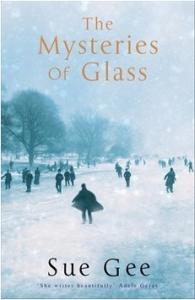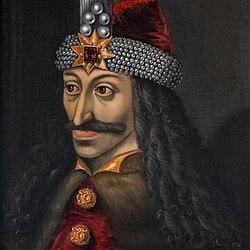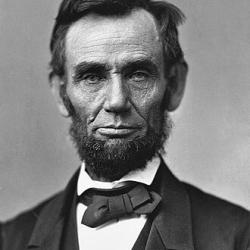Last Time on HOARATS
Stop and Pray the Angelus between 1850 – 1859
And now we enter into the 1860’s
Long Citations are taken from Dr. Wikipedia unless otherwise stated.
In the bloody Civil War that split our nation, American bishops worked for the success of the Union . . . and of the Confederacy! As Catholics slaughtered Catholics, pious priests on both sides prayed God to give success in battle. . . to their own side. Men in blue and men in gray flinched at the Consecration as cannonballs (fired by Catholic opponents) rained down on them during battlefield Masses.
Many are the moving and often surprising stories in these pages of brave Catholics on both sides of the conflict stories told by Fr. Charles Connor, one of our country s foremost experts on Catholic American history.
Through searing anecdotes and learned analysis, Fr. Connor here shows how the tumult, tragedy, and bravery of the War forged a new American identity, even as it created a new American Catholic identity, as Catholics often new immigrants found themselves on both sides of the conflict.
Fr. Connor s account shows that in the nineteenth century and on both sides of the conflict, the Church in America was a combination of visionary leadership and moral blindness much as is the Church in America today. From consideration of the strengths and weaknesses of both sides, Catholics today will discover ways to bridge the gulf that today divides so many in our Church and in our nation.- Amazon Description
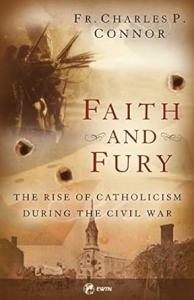
1860
Pope # 255 Bl. Pius IXwas supreme pontiff
from June 16, 1846 – February 7, 1878
(31 years, 236 days)James Buchanan (1791–1868) was
President of the United States March 4, 1857 – March 4, 1861The Mysteries of Glass Set in and around Kington and Lyonshall in rural Herefordshire in 1860/61, the story concerns Richard Allen, a young curate taking up his first position following the sudden death of his beloved father in whose steps he is following. He is determined to be of service to God and the people of his new parish, but then he falls in hopelessly love for the first time with Susannah Bowen, the wife of the vicar, who is himself dying of tuberculosis…
Picture This
1860 – Unboxing Revelation (sqpn.com) The Vision of John on Patmos by Julius Schnorr von Carolsfeld
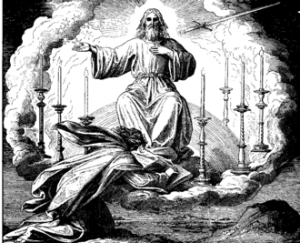
News of the World
- April 3 1860 – The first successful United States Pony Express run from St. Joseph, Missouri, to Sacramento, California, begins.
- April 6, 1860 – The Reorganized Church of Jesus Christ of Latter Day Saints, later renamed Community of Christ, is organized by Joseph Smith III and others at Amboy, Illinois.
- April 9 1860– French typesetter Édouard-Léon Scott de Martinville creates a recording of the French folk song Au clair de la lune with his phonautograph, producing the world’s earliest known intelligible sound recording of the human voice (however, it was not rediscovered until 2008).
- June 29, 1860 – The 1860 Oxford evolution debate at the Oxford University Museum of Natural History takes place.
- October 8 1860 – The telegraph line linking San Francisco and Los Angeles, California, opens.
- November 6 1860 – Abraham Lincoln is elected the 16th President of the United States with only 40% of the popular vote, defeating John C. Breckinridge, John Bell, and Stephen A. Douglas in a four-way race.
- December 20 1860 – South Carolina becomes the first state to attempt to secede from the United States.
Arrivals
- James Matthew Barrie (May 9, 1860 – June 19, 1937) Author of Peter Pan.
- Saint Charles Lwanga (January 1, 1860 – June 3, 1886)
- Juliette Gordon Low, 9October 31, 1860 – January 17, 1927) American founder of the Girl Scouts.
Departures
- Saint John Neumann (March 28, 1811– January 5, 1860) Roman Catholic Bishop of Philadelphia (b. 1811)
- Charles Goodyear, (December 29, 1800 – July 1, 1860) was an American self-taught chemist and manufacturing engineer who developed vulcanized rubber, for which he received patent number 3633 from the United States Patent Office on June 15, 1844.
Publications Hot of the Press
- Paul Revere’s Ride (1860) by American poet Henry Wadsworth Longfellow
- The Woman in White (1860) by Wilkie Collins
Good Sports
- April 17, 1860— One of the most famous fights of the bareknuckle era takes place at Farnborough, Hampshire, when English Champion Tom Sayers meets American Champion John C. Heenan in what is effectively a World Championship bout. After 42 rounds, the crowd breaks into the ring and the fight is stopped, both boxers having taken heavy punishment, although Heenan seemingly had the advantage. The result is a draw.
- National Association of Base Ball Players champion – Brooklyn Atlantics
Sanctifying Time
- Nullis Certe Verbis – On the Need for Civil Sovereignty, by Pope Pius IX, 19 January 1860
- American College established in Rome by Pope Pius IX
The Sound of Music and Other Cultural Milestones
Dixie” by Dan Emmett
Dan was an American composer, entertainer, and founder of the first troupe of the blackface minstrel tradition, the Virginia Minstrels. He is most remembered as the composer of the song “Dixie“.
Lincoln and Liberty” words by Jesse Hutchinson, Jr.
Across Five Aprils is a novel by Irene Hunt, published in 1964 and winner of a 1965 Newbery Honor, set in the Civil War era. Hunt was close to her grandfather who told her stories from his youth, which she incorporated into Across Five Aprils. Across Five Aprils is often considered the first novel of the Young Adult genre.
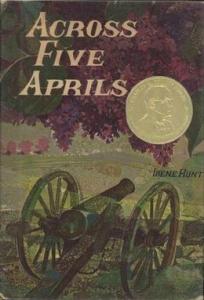
1861
Rifles for Watie is a children’s novel by American writer Harold Keith. It was first published in 1957, and received the Newbery Medal the following year. Set during the American Civil War, the plot revolves around the fictional sixteen-year-old Jefferson Davis Bussey, who is caught up in the events of history. Amidst an ongoing guerilla war pro-slavery bushwackers raid the Bussey farm in Linn County, Kansas in spring 1861, leading 16-year-old Jefferson Davis Bussey and several friends of his to leave for Fort Leavenworth and enlist as a volunteer for the Union.
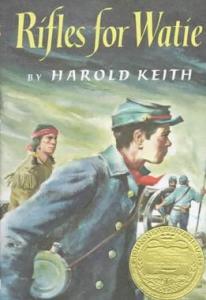
Picture This
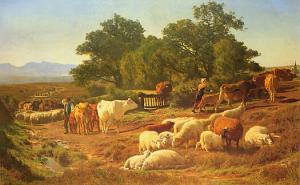
News of the World
American Civil War
January 1861– The South Secedes When Abraham Lincoln, a known opponent of slavery, was elected president, the South Carolina legislature perceived a threat. Calling a state convention, the delegates voted to remove the state of South Carolina from the union known as the United States of America. The secession of South Carolina was followed by the secession of six more states—Mississippi, Florida, Alabama, Georgia, Louisiana, and Texas–and the threat of secession by four more—Virginia, Arkansas, Tennessee, and North Carolina. These eleven states eventually formed the Confederate States of America. 1861 | Time Line of the Civil War | Articles and Essays | Civil War Glass Negatives and Related Prints | Digital Collections | Library of Congress (loc.gov)
- January 29 – Kansas is admitted as the 34th U.S. state, being admitted as a free state.
- February 4 – American Civil War: In Montgomery, Alabama, the Provisional Confederate States Congress is formed by representatives from the first seven break-away states.
- February 8 – American Civil War: The Confederate States of America are formed, comprising the first seven break-away States.
- February 9 – American Civil War: Jefferson Davis is elected Provisional President of the Confederate States of America, by the Weed Convention at Montgomery, Alabama.
- March 4
- Abraham Lincoln is sworn in as the 16th president of the United States.
- American Civil War: The “Stars and Bars” is adopted as the flag of the Confederate States of America.
- April 12, 1861 – The American Civil War begins with the bombardment of Fort Sumter, South Carolina.
- April 17 – American Civil War: The state of Virginia secedes from the Union.
- April 20 – American Civil War: Robert E. Lee resigns his commission in the United States Army, in order to command the forces of the state of Virginia.
- May 6 – American Civil War: Arkansas secedes from the Union.
- May 7 – American Civil War: Tennessee secedes from the Union.
- May 8 – American Civil War: Richmond, Virginia is named the capital of the Confederate States of America.
- May 13 American Civil War: Queen Victoria of the United Kingdom issues a “proclamation of neutrality“, which recognizes the breakaway states as having belligerent rights.
- May 20 – American Civil War:
- Kentucky proclaims its neutrality, which lasts until September 3, when Confederate forces enter the state.
- North Carolina secedes from the Union.
- July 21 – American Civil War: First Battle of Bull Run: At Manassas Junction, Virginia, the first major battle of the war ends in a Confederate victory.
Soldier’s Heart: Being the Story of the Enlistment and Due Service of the Boy Charley Goddard in the First Minnesota Volunteers is a historical war novella by Gary Paulsen aimed at the teenage market. It is a fictionalization of the true story of a Minnesotan farm boy, Charley Goddard, who at the age of 15 enlisted in the Union Army during the American Civil War. Charley lied about his age to join the First Volunteers of Minnesota and was involved in combat at Bull Run and Gettysburg. He returned home traumatized and suffering from “soldier’s heart” (Da Costa’s syndrome). Although some events and time sequences are not completely factual, the essential elements of the book’s story are true.
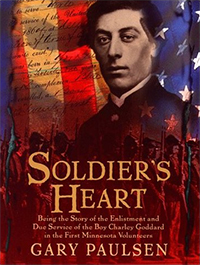
- August 10 – American Civil War: The first major battle west of the Mississippi River, the Battle of Wilson’s Creek, is fought, with a Confederate victory.
- December 10 – American Civil War: Kentucky is accepted into the Confederate States of America.
- November 28 – Acting on the ordinance passed by the Jackson government, the Confederate Congress admits Missouri as the 12th Confederate state.
Other News of the Rest of America and the World
- 1861 – British Empire establishes bases in Lagos to stop the slave trade.
- 1861 – News of Henri Mouhot‘s discovery of Angkor Wat is published.
- March 3 – Emancipation reform of 1861: Serfdom is abolished in Russia
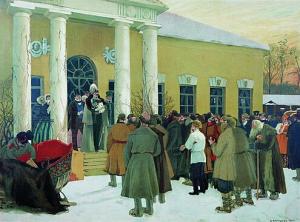
- May 13 – The Great Comet of 1861 is discovered by John Tebbutt of Windsor, New South Wales.
Sarah Emma Edmonds (December 1841 – September 5, 1898) was a British North America-born woman who claimed to have served as a man with the Union Army as a nurse and spy during the American Civil War. Although recognized for her service by the United States government, some historians dispute the validity of her claims as some of the details are demonstrably false, contradictory, or uncorroborated. She enlisted in Company F of the 2nd Michigan Infantry on May 25, 1861, also known as the Flint Union Greys. She disguised herself as a man named Franklin Flint Thompson.
Seymour Reit, the creator of Casper the friendly ghost, blended fact with fiction in his captivating tale about this woman who dared to go behind enemy lines as a spy for the Union Army.

- August 1 – The first public weather forecast: measured and predicted correctly by Admiral Robert FitzRoy
- August 19 – Weisshorn, the fifth highest summit in the Alps, is first ascended.
- October 26 – The Pony Express American transcontinental mail service announces its closure.
- November 5 – The first Melbourne Cup horse race is held in Melbourne, Australia.
- December 21 – Medal of Honor: Public Resolution 82, containing a provision for a Navy Medal of Valor, is signed into law by President Abraham Lincoln.
Gone with the Wind is a novel by American writer Margaret Mitchell, first published in 1936. The story is set in Clayton County and Atlanta, both in Georgia, during the American Civil War and Reconstruction Era. It depicts the struggles of young Scarlett O’Hara, the spoiled daughter of a well-to-do plantation owner, who must use every means at her disposal to claw her way out of poverty following Sherman‘s destructive “March to the Sea.” This historical novel features a coming-of-age story, with the title taken from the poem “Non Sum Qualis eram Bonae Sub Regno Cynarae”, written by Ernest Dowson.
Mitchell received the Pulitzer Prize for Fiction for the book in 1937. It was adapted into the 1939 film of the same name, which is considered to be one of the greatest movies ever made and also received the Academy Award for Best Picture during the 12th annual Academy Awards ceremony. Gone with the Wind is the only novel by Mitchell published during her lifetime.
Arrivals
Herminie Templeton Kavanagh (1861 – 30 October 1933) Irish author of Darby O’Gill and the Good People.
Frederick Russell Burnham (May 11, 1861 – September 1, 1947) (May 11, 1861 – September 1, 1947) was an American scout and world-traveling adventurer. He is known for his service to the British South Africa Company and to the British Army in colonial Africa, and for teaching woodcraft to Robert Baden-Powell in Rhodesia. Burnham helped inspire the founding of the international Scouting Movement.
Departures
- Nathaniel Lyon (July 14, 1818 – August 10, 1861) was the first Union Army General to die in combat in the American Civil War.
- Prince Albert, (August 26, 1819 – December 14, 1861)husband of Queen Victoria
- Herbert “Herbie” Coleridge (October 7, 1830 – April 23, 1861) was an English philologist, technically the first editor of what ultimately became the Oxford English Dictionary. He was a grandson of the poet Samuel Taylor Coleridge.
Publications Hot of the Press
- August 3,1861 – Serialization of Charles Dickens‘s Bildungsroman Great Expectations in his magazine All the Year Round is concluded; in October it is published complete in three volumes by Chapman & Hall in London.
- R. M. Ballantyne – The Gorilla Hunters is a sequel to his hugely successful 1858 novel The Coral Island and set in “darkest Africa”, its main characters are the earlier novel’s three boys: Ralph, Peterkin and Jack.
Good Sports
- The National Association establishes the December annual meeting, a change from March, meeting twice during calendar 1860. Membership slips from 59 to 55 clubs and then the outbreak of the American Civil War in the spring sharply cuts both inter-city travel and the number of matches played in greater New York City. Some clubs practically disband.
Sanctifying Time
July 1 – The first issue of the Vatican‘s newspaper L’Osservatore Romano is published.
The Sound of Music and Other Cultural Milestones
“Abide With Me“, w. Rev Henry Francis Lyte m. William Henry Monk (Words 1847)
The Perilous Road is an American Civil War novel by William O. Steele, published in 1958. It was awarded the Newbery Honor.
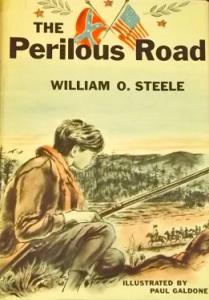
1862
Traveller is a historical novel written by Richard Adams in 1988. In his stable, Traveller, the favorite horse of retired Civil War general Robert E. Lee, relates the story of his life and experiences to his feline friend Tom. His narrative, meant to begin in the early spring of 1866, follows the events of the war as seen through a horse’s eyes, from the time he was bought by General Lee in 1862 until Lee’s death in 1870.
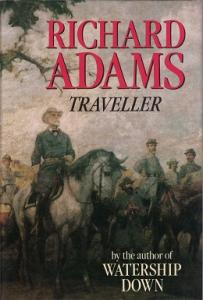
Picture This
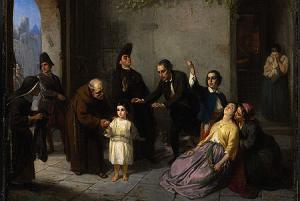
News of the World
- February 22 – American Civil War: Jefferson Davis is officially inaugurated in Richmond, Virginia, to a six-year term as president of the Confederate States.
- March 17, 1861 – The Kingdom of Italy is proclaimed on an Irish Feast Day.
- April 6–7– American Civil War: Battle of Shiloh – The Union Army, under General Ulysses S. Grant, defeats the Confederates near Shiloh, Tennessee.
- April 12 – American Civil War: Great Locomotive Chase (Andrews’ Raid) – Union volunteers steal Confederate steam railroad locomotive The General (which will still exist in the 21st century) in an attempt to sabotage the rail network. It inspired the films The General (1926) by Buster Keaton and The Great Locomotive Chase, 1956 film by Walt Disney Productions.
- April 20, 1862 – Louis Pasteur and Claude Bernard complete the experiment disproving the theory of spontaneous generation.
- May 20, 1862 – U.S. President Abraham Lincoln signs the Homestead Act into law, opening 84 million acres of public land to settlers.
- June 20, 1862– The U.S. Congress prohibits slavery in United States territories, nullifying Dred Scott v. Sandford.
- July 12,1862– The Medal of Honor is authorized by the United States Congress.
- September 22 – American Civil War : The preliminary announcement of the Emancipation Proclamation is made by U.S. President Abraham Lincoln: From January 1, 1863, slaves in the Confederate States will be considered free.
- October 3–4, 1862 – The Second Battle of Corinth (which, in the context of the American Civil War, is usually referred to as the Battle of Corinth, to differentiate it from the siege of Corinth earlier the same year) was fought in Corinth, Mississippi.
A disillusioned Confederate army deserter returns to Mississippi and leads a militia of fellow deserters and women in an uprising against the corrupt local Confederate government.- IMDB Description
- December 26 – 1862 – The largest mass-hanging in U.S. history took place in Mankato, Minnesota, where 38 Native Americans died.
A Rebel in Time (also published as Rebel in Time) is a 1983 science fiction novel by American writer Harry Harrison. In the book a man uses a secret experimental time machine to try to change the outcome of the American Civil War, giving victory to the Confederacy through the introduction of the easily manufactured Sten gun.
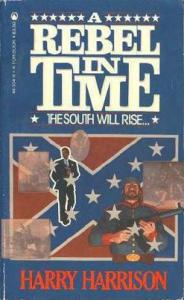
Arrivals
- Claude Debussy, (August 22, 1862 – March 25, 1918) was a French composer. He is sometimes seen as the first Impressionist composer, although he vigorously rejected the term. He was among the most influential composers of the late 19th and early 20th centuries.
- O. Henry, William Sydney Porter (September 11, 1862 – June 5, 1910) Short Story Author His works include “The Gift of the Magi“, “The Duplicity of Hargraves“, and “The Ransom of Red Chief“, as well as the novel Cabbages and Kings. Porter’s stories are known for their naturalist observations, witty narration, and surprise endings.
- Mary Kingsley,(October 13, 1862 – June 3, 1900) was an English ethnographer, writer and explorer who made numerous travels through West Africa and wrote several books on her experiences there. Historians have credited Kingsley’s work with helping to shape Western perceptions of the culture of Africa and colonialism.
Departures
- Samuel Colt (July 19, 1814 – January 10, 1862) was an American inventor, industrialist, and businessman who established Colt’s Patent Fire-Arms Manufacturing Company (now Colt’s Manufacturing Company) and made the mass production of revolvers commercially viable.
- Henry David Thoreau (July 12, 1817 – May 6, 1862) was an American naturalist, essayist, poet, and philosopher. A leading transcendentalist, he is best known for his book Walden, a reflection upon simple living in natural surroundings, and his essay “Civil Disobedience” (originally published as “Resistance to Civil Government”), an argument in favor of citizen disobedience against an unjust state.
- Simon Fraser, (May 20, 1776 – August 18, 1862) was a Canadian explorer and fur trader who charted much of what is now the Canadian province of British Columbia. He also built the first European settlement in British Columbia.
- Venarable Henriette DeLille (March 11, 1813– November 16, 1862) was a Louisiana Creole of color and Catholic religious sister from New Orleans. She founded the Sisters of the Holy Family in 1836 and served as their first Mother Superior. The sisters are the second-oldest surviving congregation of African-American religious. – American Catholic History
Publications Hot of the Press
- March 30 or 31 – The first two volumes of Victor Hugo‘s epic historical novel Les Misérables appear in Brussels, followed on April 3 by Paris publication, with the remaining volumes on May 15. The first English-language translations, by Charles Edwin Wilbour, are published in New York on June 7, and by Frederic Charles Lascelles Wraxall, in London in October.
- July 3, 1862 – Lewis Carroll tells Alice Liddell a story that would grow into Alice’s Adventures in Wonderland and its sequels.
Good Sports
December 25, 1862 – 40,000 watch Union army men play baseball at Hilton Head, South Carolina
Sanctifying Time
1862 – Four nuns serving as volunteer nurses on board USS Red Rover are the first female nurses on a U.S. Navy hospital ship.
The Sound of Music and Other Cultural Milestones
- February 1 – American Civil War: Julia Ward Howe‘s “Battle Hymn of the Republic” is published for the first time in the Atlantic Monthly.
Friendly Persuasion is a 1956 American Civil War drama film produced and directed by William Wyler. It stars Gary Cooper, Dorothy McGuire, and Anthony Perkins and takes place in 1862. Ronald Reagan gifted the film to Soviet leader Mikhail Gorbachev, symbolizing the pursuit of peaceful solutions to conflicts.
1863
The Red Badge of Courage is a war novel by American author Stephen Crane (1871–1900). Taking place during the American Civil War, the story is about a young private of the Union Army, Henry Fleming, who flees from the field of battle. Overcome with shame, he longs for a wound, a “red badge of courage”, to counteract his cowardice. When his regiment once again faces the enemy, Henry acts as flag-bearer, carrying the regimental colors.
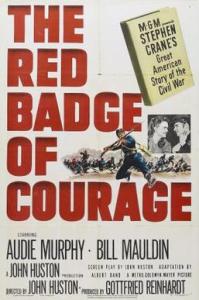
Dances with Wolves is a 1990 American epic Western film starring, directed, and produced by Kevin Costner in his feature directorial debut. It is a film adaptation of the 1988 novel Dances with Wolves, by Michael Blake, that tells the story of Union Army Lieutenant John J. Dunbar (Costner), who travels to the American frontier to find a military post, and who meets a group of Lakota. It Takes place in 1863.
Picture This
The Luncheon on the Grass– originally titled Le Bain (The Bath) – is a large oil on canvas painting by Édouard Manet created in 1862 and 1863.
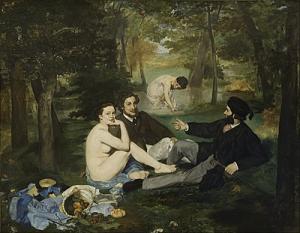
News of the World
- January 1 – Abraham Lincoln signs the Emancipation Proclamation during the third year of the American Civil War, making the abolition of slavery in the Confederate states an official war goal. It proclaims the freedom of 3.1 million of the nation’s four million slaves and immediately frees 50,000 of them, with the rest freed as Union armies advance. This event marks the start of America’s Reconstruction Era.
- January 28,1863 – The Bear River Massacre: A detachment of California Volunteers led by Colonel Patrick Edward Connor engage the Shoshone at Bear River, Washington Territory, killing hundreds of men, women and children.
- February 24, 1863 – Arizona is organized as a United States territory.
- March 14 – Queen Victoria issues Letters Patent granting Goulburn, New South Wales, city status, making it Australia’s first inland city.
- June 20 – West Virginia is admitted as the 35th U.S. state.
- July 1–3 – American Civil War: Battle of Gettysburg – Union forces under George G. Meade turn back a Confederate invasion by Robert E. Lee in the largest battle of the war (28,000 Confederate casualties, 23,000 Union).
The Killer Angels is a 1974 historical novel by Michael Shaara that was awarded the Pulitzer Prize for Fiction in 1975. The book depicts the three days of the Battle of Gettysburg during the American Civil War, and the days leading up to it
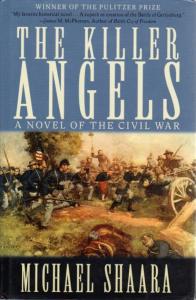
- July 14, 1863 – American Civil War: The New York City draft riots begin three days of rioting which will later be regarded as the worst in United States history.
- July 18 – American Civil War: The first formal African American military unit, the 54th Massachusetts Volunteer Infantry, unsuccessfully assaults Confederate-held Fort Wagner but their valiant fighting still proves the worth of African American soldiers during the war. Their commander, Colonel Robert Shaw, is shot leading the attack, and is buried with his men (450 Union, along with 175 Confederate).
- August 8, 1863 – American Civil War: Following his defeat in the Battle of Gettysburg, General Robert E. Lee sends a letter of resignation to Confederate President Jefferson Davis (which is refused upon receipt).
- October 26–29 – The Resolutions of the Geneva International Conference are signed by sixteen countries meeting in Geneva agreeing to form the International Red Cross.
- October 1863 – John Lincoln Clem (nicknamed Johnny Shiloh; August 13, 1851 – May 13, 1937) was an American general officer who served as a drummer boy in the Union Army during the American Civil War. He gained fame for his bravery on the battlefield, becoming the youngest noncommissioned officer in the history of the United States Army at the age of 12. In October 1863, Clem was captured in Georgia by Confederate cavalrymen while detailed as a train guard. The Confederates confiscated his U.S. uniform, including his cap, which had three bullet holes in it, which reportedly upset him terribly.[5] He was included in a prisoner exchange a short time later, and the Confederate newspapers used his age and celebrity status for propaganda purposes, to show to “what sore straits the Yankees are driven when they have to send their babies out to fight us.” After participating with the Army of the Cumberland in many other battles, serving as a mounted orderly, he was discharged in September 1864. Clem was wounded in combat twice during the war.
- November 19 – American Civil War: U. S. President Abraham Lincoln delivers the Gettysburg Address, at the military cemetery dedication ceremony in Gettysburg, Pennsylvania.
- December 19 – Linoleum is patented in the United Kingdom.
- The Hatfield–McCoy Feud involved two American families of the West Virginia–Kentucky area along the Tug Fork of the Big Sandy River from 1863 to 1891
Arrivals
- Henry Ford (July 30, 1863 – April 7, 1947)
- Edgar Allen Poe (August 8 1863 -Jan 15,1940)
Departures
- Jacob Grimm ( January 4, 1785 – September 20, 1863), He was the older brother of Wilhelm Grimm; together, they were the literary duo known as the Brothers Grimm which gave us Grimms’ Fairy Tales.
- André Cailloux (August 25, 1825 – May 27, 1863) was an African American army captain, one of the first black officers of any North American military unit. He was also one of the first black soldiers to die in combat during the American Civil War. He was killed during the unsuccessful first attack on the Confederate fortifications during the Siege of Port Hudson. Accounts of his heroism were widely reported in the press, and became a rallying cry for the recruitment of African Americans into the Union Army. – American Catholic History
Publications Hot of the Press
- February 3 – Samuel Langhorne Clemens, in signing a humorous letter to the Territorial Enterprise newspaper in Virginia City, Nevada, first uses the pen name Mark Twain.
- Charles Kingsley – The Water-Babies, A Fairy Tale for a Land Baby (complete in book form)
- Jules Verne – Five Weeks in a Balloon
Good Sports
October 26, 1863— Foundation by local clubs of the Football Association (FA) in London. The first set of Laws is drafted, based mainly on the Cambridge University Rules. The purpose is to regulate English football under a single code of rules, but the rugby football clubs do not join because of the ball handling issue. Their attempt at compromise between the “dribbling” and “handling” codes is rejected by the dribblers and so rugby football becomes in time an entirely separate sport. The FA rules establish association football (aka football or “soccer”) as a distinct sport.
Sanctifying Time
Catholics at Gettysburg – American Catholic History
Before the American Civil War, the Borough of Gettysburg had long had a strong Catholic presence, and the parish of St. Francis Xavier. Then when the armies of the Union and the Confederacy came to town, Catholics played key roles whether as soldiers, doctors, nurses, or chaplains.
The Sound of Music and Other Cultural Milestones
When Johnny Comes Marching Home
Emancipation (2022 film) is loosely based on the life of a self-emancipated slave, known as either Gordon or “Whipped Peter”. That story was made famous by the photograph of a man’s bare back heavily scourged from an overseer’s whippings, which was published worldwide as magazine illustrations in 1863, and gave the abolitionist movement proof of the cruelty of slavery.
1864
In 1864, an American Civil War troop struggles to survive when young Union soldier Jim Rabb (Ryan Merriman) discovers that his mare has given birth to a colt. A superior officer orders Jim to shoot the foal because it may become a burden, but Jim – seeing the colt as a sign of hope and a reminder of the beauty of life – refuses. The colt remains with the men as they battle. When Confederates overtake the camp and steal the colt, Jim must risk his life retrieving it.
The Widow of the South by Robert Hicks
Tennessee, 1864. On a late autumn day, near a little town called Franklin, 10,000 men will soon lie dead or dying in a battle that will change many lives for ever. None will be more changed than Carrie McGavock, who finds her home taken over by the Confederate army and turned into a field hospital. Taking charge, she finds the courage to face up to the horrors around her and, in doing so, finds a cause.
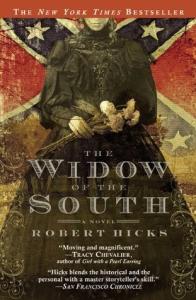
Picture This
Spring by William McTaggart 1864, NGS – William McTaggart
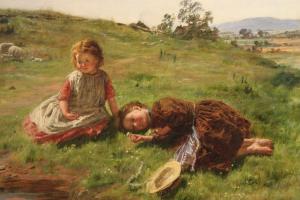
News of the World
- February 15 – Heineken Brewery is founded in the Netherlands.
- February 17 – American Civil War: The tiny Confederate hand-propelled submarine H. L. Hunley sinks the USS Housatonic (1861), using a spar torpedo in Charleston Harbor, becoming the first submarine to sink an enemy ship, although the submarine and her crew of eight are also lost.
- February 25 – American Civil War: The first Northern prisoners arrive at the Confederate prison at Andersonville, Georgia (the 500 prisoners had left Richmond, Virginia, seven days before).
Pink and Say is a children’s book written and illustrated by Patricia Polacco. It was first published in 1994 by Philomel Books. The story is about two boy soldiers who meet each other in the battlefield during the American Civil War. They both end up in Andersonville Prison.

Father Peter Whelan: The Angel of Andersonville – American Catholic History
- March 9 – American Civil War: Abraham Lincoln appoints Ulysses S. Grant commander in chief of all Union armies.
- May 15 – American Civil War: Battle of New Market – Cadets from the Virginia Military Institute fight alongside the Confederate Army, forcing Union General Franz Sigel out of the Shenandoah Valley.
- April 22 – The phrase “In God We Trust” appears for the first time on the newly created two-cent piece.
- August 22 – The First Geneva Convention, for the Amelioration of the Condition of the Wounded in Armies in the Field, is signed in Geneva by 12 European states, under the auspices of the International Committee for Relief to the Wounded (predecessor of the International Red Cross and Red Crescent Movement).
- October 31 – Nevada is admitted as the 36th U.S. state.
- November 15 – American Civil War – Sherman’s March to the Sea begins: Union General Sherman burns Atlanta and starts to move south, living off the land, and causing extensive devastation to crops and mills.
She wanted to stay awake, wanted to see what freedom looked like, felt like at midnight, then at the cusp of dawn.
Freedom. Mariah has barely dared to dream of it her entire life. When General Sherman’s march through Georgia during the Civil War passes the plantation where she is enslaved, her life changes instantly. Joining the march for protection, Mariah heads into the unknown, wondering if she can ever feel safe, if she will ever be able to put the brutalities of slavery behind her.
On the march Mariah meets a young man named Caleb, and a new dream takes root—one of a future with a home of her own and a true love by her side. But hope often comes at a cost. As the treacherous march continues toward the churning waters of Ebenezer Creek, Mariah sees that the harsh realities of her and her peoples’ lives will always haunt them.- GoodReads Description.
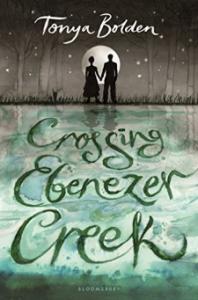
- November 29 – American Indian Wars: Sand Creek massacre – Colorado volunteers, led by Colonel John Chivington, massacre at least 400 Cheyenne and Arapaho noncombatants at Sand Creek, Colorado (where they had been given permission to camp); many of the dead are subsequently mutilated.
Arrivals
- George Washington Carver,(c. 1864 – January 5, 1943) was an American agricultural scientist and inventor who promoted alternative crops to cotton and methods to prevent soil depletion. He was one of the most prominent black scientists of the early 20th century.
- William S. Hart (December 6, 1864 – June 23, 1946) was an American silent film actor, screenwriter, director and producer. He is remembered as a foremost Western star of the silent era who “imbued all of his characters with honor and integrity.” During the late 1910s and early 1920s, he was one of the most consistently popular movie stars, frequently ranking high among male actors in popularity contests held by movie fan magazines.
Departures
- Samuel Mazzuchelli (November 4, 1806 – February 23, 1864) was a pioneer Italian Dominican friar and Catholic missionary priest who helped bring the church to the Iowa–Illinois–Wisconsin tri-state area. – American Catholic History
- Stephen Foster (July 4, 1826 – January 13, 1864), known as “the father of American music”, was an American composer known primarily for his parlour and minstrel music during the Romantic period. He wrote more than 200 songs, including “Oh! Susanna“, “Hard Times Come Again No More“, “Camptown Races“, “Old Folks at Home” (“Swanee River”), “My Old Kentucky Home“, “Jeanie with the Light Brown Hair“, “Old Black Joe“, and “Beautiful Dreamer“, and many of his compositions remain popular today.
- Nathaniel Hawthorne (July 4, 1804 – May 19, 1864) author of The Scarlet Letter (1850)
- Venerable Elizabeth Prout (September 2, 1820 – January 11, 1864) was the founder of the religious congregation of the Sisters of the Cross and Passion and is known as the “Mother Teresa of Manchester”.
Publications Hot of the Press
Good Sports
- The Atlantic club of Brooklyn, New York suffers only one early tie. One match is at Rochester against the Young Canadian club of Woodstock, Ontario, 75–11.
- New rules empower the umpire to “call” balls (bad pitches) and eventually award first base on balls, practically limiting the number of pitches and the length of each batsman’s turn.
Sanctifying Time
January 2, 1864 – Eugène Eyraud (1820 – August 23, 1868) was a lay friar of the Congregation of the Sacred Hearts of Jesus and Mary and the first Westerner to live on Easter Island. He arrived on this date to begin missionary work. Easter Island is the home of Moai which are monolithic human figures carved by the Rapa Nui people on Rapa Nui (Easter Island) in eastern Polynesia between the years 1250 and 1500.
 Source – Wikipedia
Source – Wikipedia
December 8 –Syllabus errorum: Pope Pius IX condemns theological liberalism as an error, and claims the supremacy of Roman Catholic Church authority over civil society. He also condemns rationalism and socialism.
The Sound of Music and Other Cultural Milestones
- November 25, 1864 – The brothers Edwin Booth (playing Brutus), John Wilkes Booth (who carries out the assassination of Abraham Lincoln the following year, playing Mark Antony) and Junius Brutus Booth, Jr. (playing Cassius) make their only appearance onstage together, in a performance of Shakespeare’s Julius Caesar (in the year of the playwright’s birth tricentennial) at the Winter Garden Theater in New York City, staged to raise funds for a memorial to William Shakespeare in the city’s Central Park.
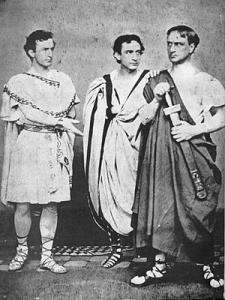
Advance to the Rear is a light-hearted 1964 American Western comedy film set in the American Civil War. Directed by George Marshall, and starring Glenn Ford, Stella Stevens, and Melvyn Douglas. The film is based on the 1957 novel Company of Cowards by Jack Schaefer, whose inspiration was an article by William Chamberlain, published in the Saturday Evening Post in 1956. Chamberlain recounts the apocryphal Civil War stories of “Company Q” (19th century army slang for the sick list), a unit composed of coward soldiers who are given a second chance to prove their bravery
The Guns of the South is an alternate history novel set during the American Civil War by Harry Turtledove. It was released in the United States on September 22, 1992.
The story deals with a group of time-traveling members of the Afrikaner Weerstandsbeweging (AWB) from an imagined 21st-century South Africa, who supply Robert E. Lee‘s Army of Northern Virginia with AK-47s and other advanced technology, medicine and intelligence. Their intervention results in a Confederate victory in the war. Afterwards, however, the AWB members discover that their ideas for the Confederate States and Lee’s are not one and the same as they believed and the general and the men of the South have a violent falling out with the white supremacists from the future.
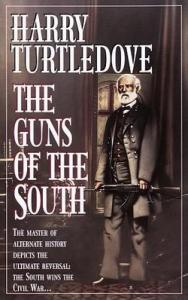
Shenandoah is a 1965 American film set during the American Civil War in 1864 and starring James Stewart.
1865
In January 1865, President Abraham Lincoln expects the Civil War to end soon, with the defeat of the Confederate States. He is concerned that his 1863 Emancipation Proclamation may be discarded by the courts after the war and that the proposed Thirteenth Amendment will be defeated by the returning slave states. He feels it imperative to pass the amendment beforehand, to foreclose any possibility that freed slaves might be re-enslaved.
Cold Mountain is a 1997 historical novel by Charles Frazier which won the U.S. National Book Award for Fiction.[1] It tells the story of W. P. Inman, a wounded deserter from the Confederate army near the end of the American Civil War who walks for months to return to Ada Monroe, the love of his life; the story shares several similarities with Homer‘s Odyssey.[2] The narrative alternates every chapter between the stories of Inman and Ada, a minister’s daughter recently relocated from Charleston to a farm in a rural mountain community near Cold Mountain, North Carolina, from which Inman hails. Though they only knew each other for a brief time before Inman departed for the war, it is largely the hope of seeing Ada again that drives Inman to desert the army and make the dangerous journey back to Cold Mountain. Details of their brief history together are told at intervals in flashback over the course of the novel.
The novel, Frazier’s first, became a major best-seller, selling roughly three million copies worldwide. It was adapted into an Academy Award-winning film of the same name in 2003.
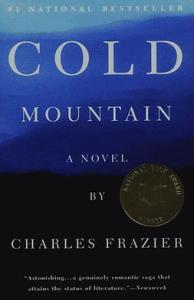
A Southern Yankee is a 1948 American comedy western film directed by Edward Sedgwick and starring Red Skelton, Brian Donlevy and Arlene Dahl.
The film is loosely based on Buster Keaton‘s The General (1926). Skelton plays a Union soldier who spies on the Confederacy during the American Civil War. Keaton served as a technical advisor for the film.
Picture This
Édouard Manet The Mocking of Christ (Art Institute of Chicago)
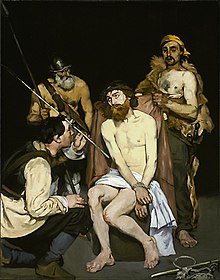
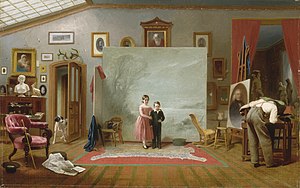
News of the World
- January 4– The New York Stock Exchange opens its first permanent headquarters at 10-12 Broad near Wall Street, in New York City.
- January 31-The Thirteenth Amendment to the United States Constitution(conditional prohibition of slavery and involuntary servitude) passes narrowly, in the House of Representatives.
- February 8 & March 8 – Fr. Gregor Mendel reads his paper on Experiments on Plant Hybridization at two meetings of the Natural History Society of Brünn in Moravia, subsequently taken to be the origin of the theory of Mendelian inheritance.
- March 4 – Abraham Lincoln is sworn in for a second term as President.
- April 9 – American Civil War: Confederate States Army General Robert E. Lee surrenders to Union Army General Ulysses S. Grant at Appomattox Court House, effectively ending the war.
- July – The Christian Mission, later renamed The Salvation Army, is founded in Whitechapel, London, by William and Catherine Booth.
- May 12–13, 1865 – American Civil War – Battle of Palmito Ranch: In far south Texas, more than a month after Confederate General Lee‘s surrender, the last land battle of the civil war with casualties, ends with a Confederate victory.
- May 29– American Civil War: President of the United States Andrew Johnson issues a proclamation of general amnesty for most citizens of the former Confederacy.
- June 26– Jumbo, a young male African elephant, arrives at London Zoo and becomes a popular attraction.
- July 5 The U. S Secret Service is founded.
- July 14– First ascent of the Matterhorn: The summit of the Matterhorn in the Alps is reached for the first time, by a party of 7 led by the Englishman Edward Whymper; 4 die in a fall during the descent.
- July 21– Wild Bill Hickok – Davis Tutt shootout: In the market square of Springfield, Missouri, Wild Bill Hickok shoots Little Dave Tutt dead over a poker debt, in what is regarded as the first true western fast draw
- December 24 – Jonathan Shank and Barry Ownby form the Ku Klux Klan in the American South, to resist Reconstruction and intimidate carpetbaggers and scalawags, as well as to repress the freedpeople.
- French missionary Father Armand David first observes Père David’s deer in Peking, China.
Arrivals
- John Mott (May 25, 1865 – January 31, 1955) was an evangelist and long-serving leader of the Young Men’s Christian Association (YMCA) and the World Student Christian Federation (WSCF). He received the Nobel Peace Prize in 1946 for his work in establishing and strengthening international Protestant Christian student organizations that worked to promote peace. He shared the prize with Emily Balch (January 8, 1867 – January 9, 1961).
- Rudyard Kipling (December 30, 1865 – 18 January 18, 1936) creator of the Jungle Book and Captain Courageous.
Departures
- April 14–Assassination of Abraham Lincoln: President of the United States Abraham Lincoln is shot while attending an evening performance of the farce Our American Cousin at Ford’s Theatre in Washington, D.C., by actor and Confederate sympathizer John Wilkes Booth.
- April 15– President Lincoln dies early this morning from his gunshot wound, aged 56. Vice President Andrew Johnson becomes the 17th President of the United States upon Lincoln’s death and is sworn in later that morning.
- April 26 – Union cavalry corner John Wilkes Booth in a Virginia barn, and cavalryman Boston Corbett fatally shoots the assassin.
Killing Lincoln: The Shocking Assassination That Changed America Forever is a book by Bill O’Reilly and Martin Dugard concerning the 1865 assassination of U.S. president Abraham Lincoln. The book was released on September 27, 2011, and is the first of the Killing series of popular history books by O’Reilly and Dugard.
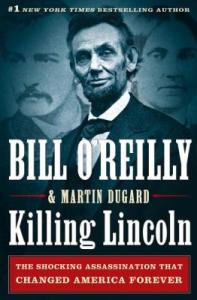
Chasing Lincoln’s Killer (2009) by
- July 7 – Following Abraham Lincoln‘s assassination on April 14, the four conspirators condemned to death during the trial are hanged, including David Herold, George Atzerodt, Lewis Powell and Mary Surratt. Her son, John Surratt, escapes execution by fleeing to Canada, and ultimately to Egypt.
Publications Hot of the Press
- July 4– Lewis Carroll publishes his children’s novel Alice’s Adventures in Wonderland in England(first trade editions in December).
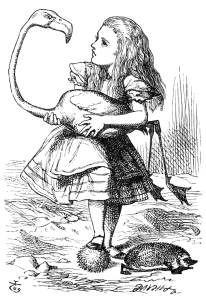
- June 9 – Charles Dickens is caught in the Staplehurst rail crash in Kent, England, together with the actress Ellen Ternan and her mother. Dickens is deeply affected by the event for the rest of his life. Also his serialised book Our Mutual Friend (publication concludes)
- Hans Brinker, or The Silver Skates by Mary Mapes Dodge –
- November 18 – Mark Twain‘s story “The Celebrated Jumping Frog of Calaveras County” is published in the New York weekly The Saturday Press in its original version as “Jim Smiley and His Jumping Frog”.
- Jules Verne – From the Earth to the Moon
Sanctifying Time
Blessed Hélène-Marie-Philippine de Chappotin de Neuville joined the Society of Marie Reparatrice in 1864, making her profession in Toulouse, France on 15 August 1865, taking the name Mary of the Passion. She became a Missionary to India in March 1865 just like Mother Teresa would several decades later..
Good Sports
- Nottingham Forest, then called Forest FC, is founded in December by its parent hockey club. It is the third oldest club in the Football League after Notts County and Stoke City. Forest and Notts County play each other twice in the 1865–66 season so the Nottingham derby is the oldest fixture among teams playing in major association football leagues worldwide.
The Sound of Music and Other Cultural Milestones
1865 – Jesus Birth What Child Is This?” is a Christmas carol with lyrics written by William Chatterton Dix and set to the tune of “Greensleeves“, a traditional English folk song, in 1871. Although written in Great Britain, the carol today is more popular in the United States than its country of origin.
Shades of Gray is a 1989 novel by Carolyn Reeder about a boy named Will. At the end of the American Civil War, twelve-year-old Will, an orphan, is left to live with his aunt and uncle. He considers his uncle a traitor and a coward because he refuses to be a Confederate and take any part in the war at all. Gradually, Will learns the true meaning of courage.
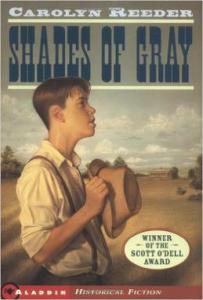
1866
Confederates in the Attic (1998) is a work of non-fiction by Pulitzer Prize-winning author Tony Horwitz. Horwitz explores his deep interest in the American Civil War and investigates the ties in the United States among citizens to a war that ended more than 130 years previously. He reports on attitudes on the Civil War and how it is discussed and taught, as well as attitudes about race.
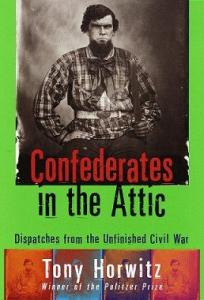
Picture This
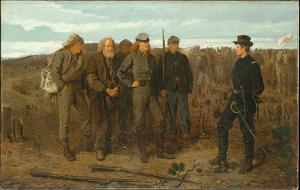
News of the World
- January 1 Fisk University, a historically black university, is established in Nashville, Tennessee.
- February 13 – The first daylight bank robbery in United States history during peacetime takes place in Liberty, Missouri. This is considered to be the first robbery committed by Jesse James and his gang, although James’s role is disputed.
- February 26 – The Calaveras Skull is discovered in California. Purported to be evidence of humans in North America during the Pliocene epoch, it turns out to be a hoax.
- March 13 – The United States Congress overwhelmingly passes the Civil Rights Act of 1866, the first federal legislation to protect the rights of African-Americans; U.S. President Andrew Johnson vetoes the bill on March 27, and Congress overrides the veto on April 9.
- April 4 – Alexander II of Russia narrowly escapes an assassination attempt in the city of St Petersburg.
- May 16 – The United States Congress approves the minting of a nickel 5-cent coin (nickel), eliminating its predecessor, the half dime.
- July 10 – Reconstruction Treaty with Choctaw & Chickasaw, completing the abolition of slavery in the United States
- July 28 – The Metric Act of 1866 becomes law and legalizes the standardization of weights and measures in the United States.
Arrivals
- Beatrix Potter,(1866 –1943) Author of Peter Rabbit.
- Winsor McCay (c. 1866–71 – July 26, 1934) creator of the comic Little Nemo.
- Butch Cassidy, (April 13, 1866 – November 7, 1908)American outlaw
- Anne Sullivan, (April 14, 1866 – October 20, 1936) American tutor of Helen Keller
- H. G. Wells,(September 21,1866 –August 13,1946) Author of the Time Machine and War of the Worlds.
Departures
- Alexander Campbell, (September 12, 1788 – March 4, 1866) Irish/U.S. founder of the Disciples of Christ
- Sir George Everest, July 4, 1790 – December 1, 1866) In 1865, the Royal Geographical Society renamed Peak XV – at the time only recently identified as the world’s highest peak – to Mount Everest in his honour.
Publications Hot of the Press
- Crime and Punishment (1866)
- 1866 –Pope Joan The Greek author Emmanuel Rhoides‘ publishes The Papess Joanne. The novel is an exploration of the European legend of Pope Joan, a woman who secretly reigned as pope some time in the late ninth century. It was admired by Mark Twain.
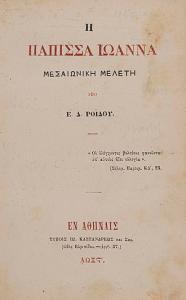
Good Sports
Sanctifying Time
- Canons Regular of the Immaculate Conception is founded.
The Sound of Music and Other Cultural Milestones
- March–December – Pyotr Ilyich Tchaikovsky writes his Symphony No. 1, Winter Daydreams.
“An Occurrence at Owl Creek Bridge” (1890) is a short story by American writer and Civil War veteran Ambrose Bierce, described as “one of the most famous and frequently anthologized stories in American literature”. It was originally published by The San Francisco Examiner on July 13, 1890, and was first collected in Bierce’s book Tales of Soldiers and Civilians (1891). It is also found in Civil War Stories
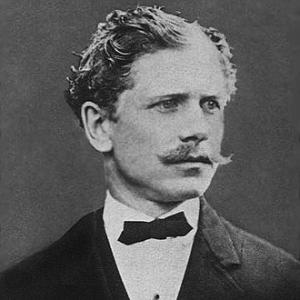
The Luminaries is a 2013 novel by Eleanor Catton. Set in New Zealand‘s South Island in 1866, the novel follows Walter Moody, a prospector who travels to the West Coast settlement of Hokitika to make his fortune on the goldfields. Instead, he stumbles into a tense meeting between twelve local men, and is drawn into a complex mystery involving a series of unsolved crimes. The novel’s complex structure is based on the system of Western astrology, with each of the twelve local men representing one of the twelve signs of the zodiac, and with another set of characters representing planets in the solar system.
The novel has won many awards and honours, including the 2013 Booker Prize. It was adapted into the BBC/TVNZ miniseries The Luminaries in 2020. In 2022, it was included on the “Big Jubilee Read” list of 70 books by Commonwealth authors, selected to celebrate the Platinum Jubilee of Elizabeth II.

1867
F Troop is set at Fort Courage—a fictional United States Army outpost in the Old West, from near the end of the American Civil War in 1865 to at least 1867. A town of the same name is adjacent to the fort. Fort Courage was named for the fictitious General Sam Courage (portrayed by Cliff Arquette). The fort is constructed in the stockade style typically found in most American Westerns.
Picture This
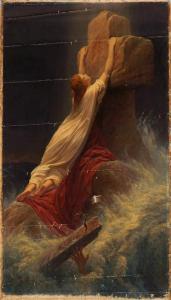
News of the World
- January 1 – The Covington–Cincinnati Suspension Bridge opens between Cincinnati, Ohio, and Covington, Kentucky, in the United States, becoming the longest single-span bridge in the world. It was renamed after its designer, John A. Roebling, in 1983.
- January 8 – African-American men are granted the right to vote in the District of Columbia.
- March 1 – Nebraska is admitted as the 37th U.S. state.
- March 16 – An article by Joseph Lister, outlining the discovery of antiseptic surgery, is first published in The Lancet.
- March 30 – Alaska Purchase: Alaska is purchased for $7.2 million from Alexander II of Russia, about 2 cents/acre ($4.19/km2), by United States Secretary of State William H. Seward. Newspapers call this Seward’s Folly.
- May 7 – Alfred Nobel patents dynamite in the United Kingdom.
- November 9 – The last shōgun of Japan, Tokugawa Yoshinobu, (October 28, 1837 – November 22, 1913) tenders his resignation to Emperor Meiji.
- December 18 – Angola Horror (Buffalo, New York-area train wreck): The fiery death of 49 people leads John D. Rockefeller to develop and sell his Mineral Seal 300 °F (149 °C) Fire-Tested Burning Oil, and George Westinghouse to invent the railway air brake, which is mandated in the United States in 1893.[
Arrivals
- Cy Young (March 29, 1867 – November 4, 1955) was an American Major League Baseball (MLB) pitcher. In 1956, one year after his death, the Cy Young Award was created to annually honor the best pitcher in the Major Leagues (later each League) of the previous season, cementing his name as synonymous with excellence in pitching.
- Marie Curie, (November 7, 1867 – July 4, 1934) Polish-born scientist, recipient of the Nobel Prize in Chemistry and physics
Departures
- Francis Xavier Seelos CSsR (January 11, 1819 – October 4, 1867) was a German Redemptorist who worked as a missionary in the United States frontier. Towards the end of his life, he went to New Orleans to minister to victims of yellow fever. He then died after contracting the disease.
- November 23 – The three ‘Manchester Martyrs‘ are hanged in England for the murder of a policeman whilst attempting to rescue two Irish Republican Brotherhood members from imprisonment on 18 September.
Publications Hot of the Press
- December 2 – Charles Dickens begins a U.S. reading tour in New York City.
- December – After publication of Leo Tolstoy‘s 1805, an early version of War and Peace, concludes in The Russian Messenger, an advertisement appears for the revised complete novel.
- Mark Twain – The Celebrated Jumping Frog of Calaveras County was Mark Twain’s first book and collected 27 stories that were previously published in magazines and newspapers.
Good Sports
- The National baseball club of Washington (original Washington Nationals) tours from Ohio to Missouri, playing ten matches in 17 days. Like the Excelsiors tour of New York state in 1860, the Nationals boost the game and demonstrate advanced points of play to fans and players. Several top teams will tour on a similar national scale in the next few years.
- June 20 – The first recorded association football match in Argentina took place in Buenos Aires.
Sanctifying Time
February 28 – After almost 20 years (1848), the United States Congress forbids taxpayer funding of diplomatic envoys to the Holy See (Vatican), and breaks off relations. Funding resumes, along with relations, in 1984.
The Sound of Music and Other Cultural Milestones
Für Elise The score was not published until 1867, forty years after Ludwig van Beethoven‘s death in 1827.
May 11 – The first comic opera with a score by Arthur Sullivan to be publicly performed, the one-act Cox and Box with libretto by F. C. Burnand, opens at the Adelphi Theatre in London and runs for 300 performances. It is followed by the two-act The Contrabandista, or The Law of the Ladrones by the same partnership which opens on December 18 at St. George’s Hall, London.
The Daring Young Man on the Flying Trapeze
- February 15 – Johann Strauss II‘s waltz The Blue Danube (An der schönen blauen Donau) is first performed, at a concert of the Vienna Men’s Choral Association. Later this year, Strauss will adapt it into its popular purely orchestral version for the Exposition Universelle in Paris.
1868
A bounty hunter trying to bring a murderer to justice is forced to accept the help of two less-than-trustworthy strangers.- IMDB Description.
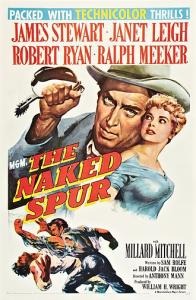
Picture This

News of the World
- February 24
- Impeachment of Andrew Johnson: Three days after his action to dismiss United States Secretary of War Edwin M. Stanton, the United States House of Representatives votes 126–47 in favor of a resolution to impeach Andrew Johnson, President of the United States, the first of three Presidents to be impeached by the full House. Johnson is later acquitted by the United States Senate.
- The first parade to have floats takes place at Mardi Gras in New Orleans.
- March – French geologist Louis Lartet discovers the first identified skeletons of Cro-Magnon, the first early modern humans (early Homo sapiens sapiens), at Abri de Crô-Magnon, a rock shelter at Les Eyzies, Dordogne, France.
- May 16, May 26 – President Andrew Johnson is twice acquitted during his impeachment trial, by one vote in the United States Senate.
- May 29 – The Parliament of the United Kingdom passes the Capital Punishment Amendment Act, thus ending public hanging.
- May 30 – Memorial Day is observed in the United States for the first time (it was proclaimed on May 5 by General John A. Logan).
- July 1 – The cable-operated West Side and Yonkers Patent Railway in Manhattan becomes the first elevated railway in the United States.
- July 5 – Preacher William Booth establishes the Christian Mission, predecessor of The Salvation Army, in the East End of London.
- July 9, 1868: 14th Amendment is Ratified. It defines citizenship, it contains the Privileges or Immunities Clause, the Due Process Clause, and the Equal Protection Clause, and dealt with post–Civil War issues.
- October 6 – The City of New York grants Mount Sinai Hospital a 99-year lease for a property on Lexington Avenue and 66th Street, for the sum of $1.00.
- November 3 – 1868 United States presidential election: Republican Ulysses S. Grant defeats Democrat Horatio Seymour.
- December 25 – U.S. President Andrew Johnson grants unconditional pardon to all Civil War rebels.
Arrivals
- Gaston Leroux, (May 6, 1868 – 15 April 15, 1927) author of The Phantom of the Opera.
- Scott Joplin, (November 24, 1868 – April 1, 1917) was an American composer and pianist. Dubbed the “King of Ragtime“,he composed more than 40 ragtime pieces, one ragtime ballet, and two operas. One of his first and most popular pieces, the “Maple Leaf Rag“, became the genre’s first and most influential hit, later being recognized as the quintessential rag. Joplin considered ragtime to be a form of classical music meant to be played in concert halls and largely disdained the performance of ragtime as honky tonk music most common in saloons.
Departures
- Venerable Frederic Baraga(June 29, 1797 – January 19, 1868) was a Slovenian Catholic missionary to the United States, grammarian and author of Christian poetry and hymns in Native American languages. He was the first Bishop of Sault Sainte Marie and Marquette, a post he held for 15 years. His letters about his missionary work were published widely in Europe, inspiring the priests John Neumann and Francis Xavier Pierz to emigrate to the United States. – American Catholic History
- Adah Isaacs Menken was an American actress, painter and poet, and was the highest earning actress of her time. She was best known for her performance in the hippodrama Mazeppa, with a climax that featured her apparently nude and riding a horse on stage.
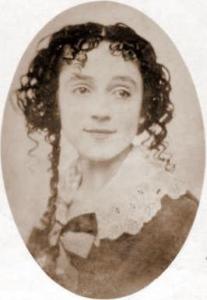
Publications Hot of the Press
- January 4–August 8 – Wilkie Collins‘ epistolary novel The Moonstone: a Romance is serialised in All the Year Round (U.K.), being published in book format in July by Tinsley Brothers of London It is seen as a precursor of full-length mystery fiction (with its introduction of the police detective Sergeant Cuff) and the psychological thriller
- September – The first volume of Louisa May Alcott‘s novel for girls Little Women is published by Roberts Brothers of Boston, Massachusetts.
- The first edition of The World Almanac and Book of Facts is published by the New York World.
- Jules Verne – In Search of the Castaways
Good Sports
- A team of Australian Aboriginals tours England, the first organised group of Australian cricketers to travel overseas and the first overseas team to complete a tour of England, although none of the matches have subsequently been given first-class status.
Sanctifying Time
Catholic Stuff Founded
- Archdiocese of Denver, Colorado
- Diocese of Boise City, Idaho
- Diocese of Columbus, Ohio
- Diocese of Green Bay, Wisconsin
- Diocese of Harrisburg, Pennsylvania
- Diocese of Wilmington, Delaware
- Missionaries of Africa
The Sound of Music and Other Cultural Milestones
O Little Town of Bethlehem Based on an 1868 text written by Phillips Brooks, the carol is popular on both sides of the Atlantic, but to different tunes: in the United States, to “St. Louis” by Brooks’ collaborator, Lewis Redner; and in the United Kingdom, Canada, and Ireland to “Forest Green”, a tune collected by Ralph Vaughan Williams and first published in the 1906 English Hymnal.
1869
In Post-Bellum Texas, an army captain tries to keep the peace between overtaxed, impoverished farmers and greedy carpetbaggers.- IMDB Description
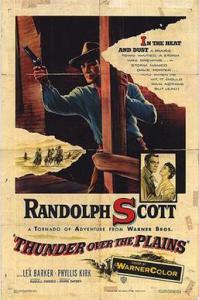
Picture This
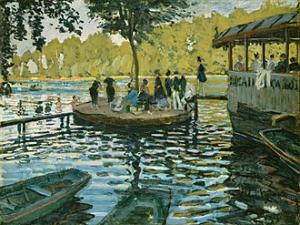
News of the World
- January 20 – Elizabeth Cady Stanton is the first woman to testify before the United States Congress.
- March 1 – Dmitri Mendeleev (February 8 , 1834 – February 2, 1907) finishes his design of the first periodic table and sends it for publishing.
- March 4 – Ulysses S. Grant is sworn in, as the 18th President of the United States.
- March 11, 1869 – The West first learned of the giant panda on , when the French missionary Armand David received a skin from a hunter. The first Westerner known to have seen a living giant panda is the German zoologist Hugo Weigold, who purchased a cub in 1916.
- April 6 – The American Museum of Natural History is founded in New York.
- May 10 – The first transcontinental railroad in North America is completed at Promontory, Utah, by the driving of the “golden spike“. This is seen in the film The Iron Horse.
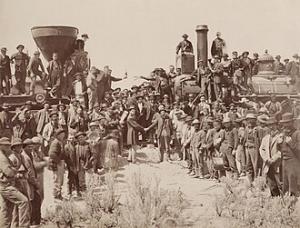
- May 15 – Women’s suffrage: In New York, Susan B. Anthony and Elizabeth Cady Stanton form the National Woman Suffrage Association.
- July 26 – The Irish Church Act 1869 is given royal assent by Queen Victoria, disestablishing the Church of Ireland effective January 1, 1871.
- September 24 – Black Friday: The Fisk–Gould Scandal causes a financial panic in the United States.
- December 7 – American outlaw Jesse James commits his first confirmed bank robbery, in Gallatin, Missouri.
- Campbell Soup Company is founded in New Jersey, United States.
- Heinz, as predecessor of Kraft Heinz, a worldwide food processing and cheese brand, founded in Pennsylvania, United States.
- St. Ignatius College Prep in Chicago is founded, and construction on the school’s main building began. It is one of only five buildings that survived the Great Chicago Fire of 1871. The building was designed by the Canadian architect Toussaint Menard in the Second Empire architecture style.
- May 24 – John Wesley Powell departs Green River, Wyoming, with a company of 9 other men, on a trip down the Green and Colorado Rivers on the Powell Geographic Expedition of 1869 This was the first thorough cartographic and scientific investigation of long segments of the Green and Colorado rivers in the southwestern United States, including the first recorded passage of white men through the entirety of the Grand Canyon. HIs expedition is told in the film Ten Who Dared.
Arrivals
- Saint Josephine Bakhita F.D.C.C. (ca. 1869 – 8 February 8, 1947)
- Mohandas Gandhi (October 2, 1869 – January 30, 1948)
Departures
- Mary Ward (April 27, 1827 – August 31,1869) was an Irish naturalist, astronomer, microscopist, author, and artist. She was killed when she fell under the wheels of an experimental steam car built by her cousins. As the event occurred in 1869, she is the first person known to have been killed by a motor vehicle.
- John E. Wool, (February 20, 1784 – November 10, 1869) was an officer in the United States Army during three consecutive U.S. wars: the War of 1812, the Mexican–American War and the American Civil War. He also participated in the Rogue River Indian War and the Trail of Tears ethnic cleansing of Native Americans. By the time of the Mexican-American War, he was widely considered one of the most capable officers in the army and a superb organizer.
Publications Hot of the Press
- February 3 – Booth’s Theatre opens on Manhattan with the owner, Edwin Booth, playing the male lead in Shakespeare’s Romeo and Juliet.
- December – Publication of Leo Tolstoy‘s novel War and Peace («Война и миръ», Voyna i mir) complete in book form concludes. It is printed in Moscow and sold by the author on subscription.
- August
- Ambrose Bierce, writing a satirical column for the San Francisco News Letter, begins to produce the cynical definitions which will eventually become The Devil’s Dictionary.
- Macmillan Publishing opens its first American office in New York City, headed by George Edward Brett.
- Fyodor Dostoyevsky – The Idiot
- P. T. Barnum – Struggles and Triumphs
- Mark Twain – The Innocents Abroad
Good Sports
- The Cincinnati Red Stockings became the first all-professional team in baseball with ten salaried players.
- November 6 – The first game of American football between two American colleges is played. Rutgers University defeats Princeton University 6–4, in a forerunner to American football and College football.
Sanctifying Time
December 8, 1869 – The First Vatican Council opens in Rome.
The Sound of Music and Other Cultural Milestones
- “Shoo Fly, Don’t Bother Me” attributed to T. Brigham Bishop (possibly w. Billy Reeves m. Frank Campbell)
The Little Brown Jug” by J. Eastburn Winner
Oldest Living Confederate Widow Tells All
On her 99th birthday, Lucy Honicut Marsden recalls her life as the 14-year-old bride of a veteran of the American Civil War.
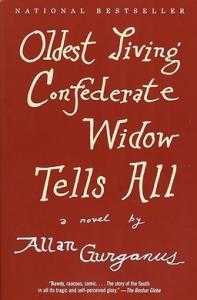
Next Time on
HOARATS
The Post Civil War Years – 1870 – 1879
To Understand
What I love and How I Write About History
Hit the Link Above.
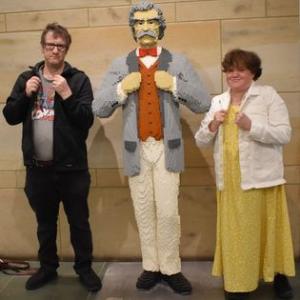
To understand about this particular series I’m writing about, please read
The Catholic Bard’s Guide To History Introduction
And to view a historical article click on


